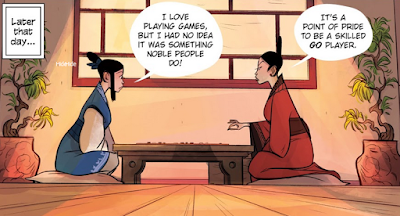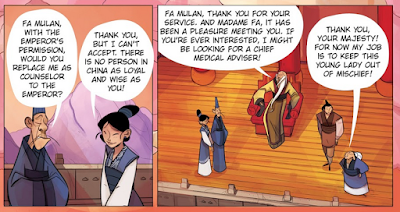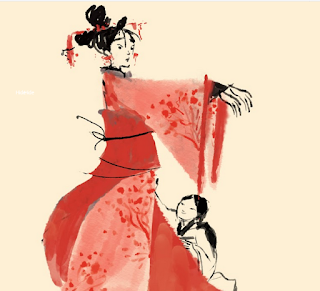Comic: Disney - Mulan's Adventure Journal: The Palace of Secrets, by Rhona Cleary (author), Agnese Innocente, Gaia Cardinally, and Ilaria Urbinati (illustrators).
5/5 Goodreads review also here. I really liked this comic, especially the beautiful art style and the frequent feminist points in the plot :D
+1 An all-female team of writer and artists!
+1 An all-female team of writer and artists!
+1
The graphic book alternates between comic-style and Mulan's thoughts
and narration in diary form, often accompanied by lovely Chinese-style
illustrations.
+1 Enjoyable, engaging plot where Mulan is
summoned to the Imperial City in order to help unmask a cult member in
the court plotting to assassinate the Emperor. As well as gifting us
with 24/7 feminist commentary, Mulan has her badass active moments, from
taking out a snake in the Emperor's chambers, to actively searching for
the spy in the Palace, fighting her way out of a cult meeting, and
avoiding the Emperor's assassination with the help of Grandma Fa and
Shang. Another woman in the plot also shows fighting training, which was
a nice touch.
+1 Female bonding/Bechdel and secondary female characters: Badass Grandma Fa,
who thinks it's high time she travelled and had an exciting time xD,
joins Mulan in her trip to the Imperial Palace, and ends up having an
important role in the plot in order to prevent the Emperor's
assassination - and also chats with the Emperor about her passion for
herbs and medicine xD I would have liked to see a bit more interaction
between Grandma Fa and Mulan, but what we got was lovely nonetheless.
+1 The feminist points shown throughout the story are top-notch. Mulan offers a continuous critique of gender roles, compulsory femininity (especially regarding encumbering traditionally female clothing), and the isolation of women.
-In spite of having been able to gain fame as a warrior and a heroine, Mulan is still very much constrained by the traditional gender roles of the patriarchal society she's in, her validity still limited to her appearance in many ways, and expected to conform to traditional femininity every time there's a formal event or a party - Even when her mission in the Imperial Palace is one of a trained warrior seeking to unmask an assassin, she's repeatedly asked to wear encumbering formal-wear and follow strict etiquette she cannot get accustomed to.
Like Merida, Mulan is not especially fond of what she sees as uncomfortable clothing (which happens to coincide with traditionally female clothing, as it usually does :S), and would much rather wear her comfy dresses and pant outfits:
I love how this story repeatedly offers a critique of how female wear is so often uncomfortable, as well as particularly limiting when paired with traditional gender roles. There's nothing wrong with loving a dress and that can be paired with glorious feminism as well (Elsa is proof of that), but it's also very important to offer a social critique of this because uncomfortable female wear is still compulsory and strictly socialized in more than one job and context today.
And she may be a woman on a mission, but my girl Mulan be
questioning societal rules and expectations every ten seconds in this
story, dropping feminist critique like this every time she can,
including but no limited to complaining about uncomfortable shoes before
the Emperor after fighting off several cult members on her own and
jumping off a roof xD
-Mulan also tackles gendered socialization
and the isolation of women, commenting on how she and other women feel
stifled and caged (in her home, in the Palace, etc), as women are
traditionally more confined, limited and isolated in a society with
traditional gender roles. Mulan starts the story saying that, while
she's glad to be home with her family in the events after the war
against the Huns, she can't help to feel more stifled and dissatisfied
with her current lifestyle, back to basically following traditional
gender roles, in spite of having gained fame and recognition in the
Imperial City. She misses how subverting those roles meant a more active
life for her, more 'full of purpose', which suits her personality more.
+-1 Relationship with Shang: I personally hate how they portrayed the dynamic between Shang and Mulan in Mulan 2 (which doesn't really exist for me, I'm sorry, nope). I don't like everything about Shang in Mulan 1, but in the sequel I remember him being incredibly entitled, seist, insufferable and controlling. Fortunately, i can get behind the dynamic they're having in this comic more easily. They communicate way more, Shang seems to appreciate Mulan's badassery without feeling threatened, and Mulan doesn't stop doing stuff just because she also likes him and is getting into a relationship with him (not like in Mulan 2 ahem).
Of course,
regarding the last point, the dynamic would probably change at least a
bit because of how the marriage system and mindset usually works
legally, societally and mentally in a patriarchal society (aka Mulan 2
:S), unless the bloke in question were a pretty deconstructed ally by
then.
The part that I liked the least about the dynamic in the
story was the fact that Shang used the entitled 'I need to protect the
woman' patriarchal chivalry card for a while by masquerading as a stable
boy in order to 'protect' Mulan from the assassination plot (without
knowing she was very much aware and actually in charge of the operation
to unmask the cult member lol xD). The dynamic was back to being
reasonably good once they met and communicated, working together to
prevent the assassination while also keeping Mulan in the spotlight. But
it was still a bit grating to see the unnecessary deceit, as he might
have ignored the role of Mulan in all this, but he could also have
actually told her she was potentially in danger in the first place if he
was worried about her safety, instead of 'looking out for her' in a
pretty patronizing and stalker-ish way without telling her anything :S.
 |
| In this house we stan Grandma Fa :D xD |
Mulan also bonds with other women in the palace, such as with her
handmaiden Yu, and with the Emperor's Cousin, Li Mei.
+-1 I'm not the biggest fan of monarchy and the class system, but it is nice to see that the Emperor is trying to prevent further wars, and the final antagonist, who turns out to be (spoiler) the Emperor's cousin herself, Li Me (whose son was killed in the war against the Huns),
is criticized for her motivations based on vengeance and the desire for
war. I also liked the grey-morality and female bonding from Mulan's
part when it comes to judging the motivations and mindset of the
antagonist, as she disagrees with her mindset, but at the same time can
also understand her motivations and sympathizes with her situation.
+-1
We see no women at court in positions of power and only see them as
courtiers, noblewomen who have to gain power and influence by scheming
behind everyone's backs, and handmaidens. But in spite of this clearly
male-dominated court and society, the men in this story (the Emperor,
Shang) generally appreciate and respect the abilities of women like
Mulan and Grandma Fa, who at some point are offered the positions of the
Emperor's Chief Counsellor and the Chief Medical Officer, respectively.
Also, Counsellor Chi Fu finally catches up and gains respect and
appreciation for the warrior training and intelligence of Mulan, and
both of them become friends. Mulan is also honoured as a heroine and warrior in the Imperial City, as she finds out when she arrives :D
+1 The feminist points shown throughout the story are top-notch. Mulan offers a continuous critique of gender roles, compulsory femininity (especially regarding encumbering traditionally female clothing), and the isolation of women.
-In spite of having been able to gain fame as a warrior and a heroine, Mulan is still very much constrained by the traditional gender roles of the patriarchal society she's in, her validity still limited to her appearance in many ways, and expected to conform to traditional femininity every time there's a formal event or a party - Even when her mission in the Imperial Palace is one of a trained warrior seeking to unmask an assassin, she's repeatedly asked to wear encumbering formal-wear and follow strict etiquette she cannot get accustomed to.
Like Merida, Mulan is not especially fond of what she sees as uncomfortable clothing (which happens to coincide with traditionally female clothing, as it usually does :S), and would much rather wear her comfy dresses and pant outfits:
I love how this story repeatedly offers a critique of how female wear is so often uncomfortable, as well as particularly limiting when paired with traditional gender roles. There's nothing wrong with loving a dress and that can be paired with glorious feminism as well (Elsa is proof of that), but it's also very important to offer a social critique of this because uncomfortable female wear is still compulsory and strictly socialized in more than one job and context today.
Also, while she appreciates the luxuries of the Imperial Palace, Mulan
also sees the place as a gilded cage. While bonding with Li Mei, she
notices how the noblewoman seems to lead a pretty isolated life, with
not many people to talk to, and worries about her being too lonely
leading a boring life inside the Palace.
+-1 Relationship with Shang: I personally hate how they portrayed the dynamic between Shang and Mulan in Mulan 2 (which doesn't really exist for me, I'm sorry, nope). I don't like everything about Shang in Mulan 1, but in the sequel I remember him being incredibly entitled, seist, insufferable and controlling. Fortunately, i can get behind the dynamic they're having in this comic more easily. They communicate way more, Shang seems to appreciate Mulan's badassery without feeling threatened, and Mulan doesn't stop doing stuff just because she also likes him and is getting into a relationship with him (not like in Mulan 2 ahem).
And bonus moment of Mulan representing all us introverts 100% accurately xDD
And finally, the IG storytime with more or less the same text content, but a little bit more info on the plot points (also here):













































